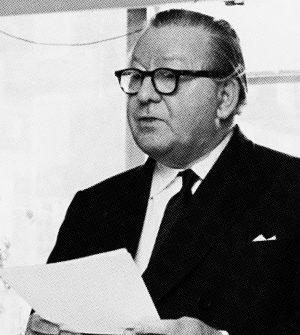ATV financial results: 1962
Sir Robert Renwick on Associated Television Limited’s 1962 results

POLICY OF “REAL COMPETITION” ADVOCATED THROUGH ADDITIONAL COMMERCIAL T.V. CHANNEL
LOWER PROFIT FROM REDUCED REVENUE, GREATLY INCREASED COSTS AND DEVELOPMENT EXPENDITURE ON NEW SUBSIDIARIES
SIR ROBERT RENWICK CRITICIZES ATTACK ON ADVERTISING
The Seventh Annual General Meeting of Associated Television Limited will be held on September 26 at ATV House, Great Cumberland Place, London, W.
The following is the statement by Sir Robert Renwick, Bt, K.B.E., the chairman, circulated with the report and accounts for the year ended April 30, 1962:—
You will see from the consolidated profit and loss account that the profit of the Group before taxation is £5,038,204 [£89.4m in today’s money allowing for inflation – Ed] as compared with £6,411,899 [£113.8m] for the previous year. This profit is after charging all expenses including depreciation. The provision for depreciation of £439,986 [£7.8m] shows an increase of £157,463 [£2.8m] as compared with the previous year, due to the fact that this is the first year in which is charged a full year’s depreciation on new equipment at our Elstree Studios.
After making allowance for taxation of £2,658,935 [£47.2m] and the interests of outside shareholders, there is left a profit of £2,387,884 [£42.4m] attributable to ATV.
The amount retained in subsidiary companies is £113,708 [£2m] and the balance brought forward from last year is £1,859,608 [£33m], making £4,133,784 [£73.3m] available for appropriation.
An interim dividend of 20 per cent has already been paid and your directors now recommend that a final dividend of 40 per cent be paid again this year. If this recommendation is approved, there will be left a balance of £2,424,909 [£43m] to be carried forward in the accounts of the parent company.
Consolidated Balance-Sheet
Turning to the consolidated balance-sheet it will be noted that under the heading of fixed assets there have been increases both in land and buildings and in plant, equipment and motor vehicles. These are attributable to our new studios at Elstree which are now completed and fully equipped. Whereas the total of trade investments has not altered materially, it will be noted that quoted shares have increased and debentures and loan stock have decreased. This is mainly due to the conversion into shares of the £500,000 [£8.9m] convertible loan stock in British Relay Wireless and Television Limited.
We already have in our balance-sheet an investment reserve of £500,000. Taking our trade investments and investments in subsidiary companies together, your directors are satisfied that the present investment reserve is adequate.
The reduction in Group profit for the year is due to three main causes — greatly increased cost of operations, reduction in advertisement revenue and losses made by subsidiaries in early stages of development
We believe that in time our subsidiaries will make a very useful contribution to the income of your Company. We have never stated, as I have seen reported, that our Company could maintain its present dividend from sources other than the profit which we make as television programme contractors. Our profit at present comes mainly from our operations as contractors for Saturday and Sunday in London and for the five weekdays in Birmingham and the Midlands. These two broken periods are, economically far from ideal.
We advocate a policy of real competition in Commercial television through an additional commercial channel. If we were to have a seven-day operation, not only would there then be real competition, but we would be able to use to the fullest degree, both at home and through our export subsidiaries, the new studios which we have constructed at Elstree, which are the equal of any in the world.
Efforts to Improve Television
Our purpose is to provide good television, and by ploughing back profits into the studios at Elstree we have supplied concrete evidence that we are making in the field of television production the sort of contribution which the Government must have believed in when we were appointed. Nevertheless, it must be appreciated that though we have been able to improve programme standards by bringing into operation the new studios at Elstree with their complex and up-to-date equipment, this has not been achieved without at the same time increasing production costs. Similarly the awards which have been made as a settlement of the Equity strike are also contributing to increased day-to-day costs of putting programmes on the air.
Last year my predecessor in his statement said: “We confirmed to the Pilkington Committee that we accepted the recommendations of the Television Advisory Committee for the adoption of 625 lines as the British standard. In order to give effect to this we offered, on the days we were not broadcasting in London, to put out a new programme on 625 lines in the UHF band which would carry in addition one hour a day of 625 line colour broadcasting — all at our own expense. Surely this would be a great contribution, and something that would give encouragement to the scientists, the technicians, the script writers, the producers and all the many people who will benefit from an expansion of television broadcasting.”
There has been a great deal written about the profits which contractors have made. It is surprising to me that, when a contractor offers to divert a large slice of its profit and to plough it back into advancing the art of television broadcasting, as we proposed, this should not have been mentioned in the Pilkington Report. It seems to me that to use profits to expand the art of broadcasting and to make new programmes available is a better alternative than to force companies, by penal taxation, to pass money to the Exchequer to spend on providing the public, not necessarily with what the public enjoys, but with with what the Pilkington Committee thinks it ought to have.
I am not one to believe that we are called on to make any defence because of the profits we have made in recent years but I think it is a good thing to repeat what the Hankey Committee on television stated in 1945:—
“It is quite clear that, until the television service is well developed, commercial interests would not be willing to incur large expenditure for this purpose, owing, for example, to the limited audience served. In the early stages, therefore, we could not expect sponsored programmes to provide a substantial contribution towards the cost of the television service. In these circumstances and without prejudicing the matter for the future, we feel it would be premature to come to a conclusion on this question.”
I can say that, for several years before and after the war, the people concerned in promoting commercial television lost a considerable amount of money in financing the pioneering work and when eventually the Government agreed to set up a commercial television service it was far from easy to find sufficient sources of capital. This only confirmed the conclusions of the Hankey Committee.
No sooner had the independent television operation started than the rate at which money was being lost became so alarming that it was extremely hard to get any new money. In our own company almost the entire original capital was lost in the first year, so that, far from having “a licence to print money”, we found that we had a licence to lose money in millions. Yet a substantial number of the people who were original shareholders put their hands back into their pockets and produced further capital. Even so, it proved necessary to go outside the group for still further backing. It is easy to be wise after the event, but when one considers the risk involved in putting up money for what, on the best authority, was a very long-odds chance, I cannot agree that the criticisms of large profits are warranted.
It should not be forgotten, that, if risk capital had not been put up six years ago, we would not have had commercial television. We would still have the low standard of television broadcasting which existed at that time. Occasions are bound to arise when it may be necessary to depend on voluntary risk capital if the many projects and services of the future are to be developed. If the Government undermines the confidence of the investor it will make it impossible to get the financial support which will be required if we are to bring many new inventions to the light of day.
The most important objective in the day-to-day existence of your Company is the creation and production of programmes. In London we have Saturday and Sunday. These are the two days when the great mass of our people have time off from work and look forward to relaxation and pleasure. The daily drudgery of any worker can be lightened considerably if great care is given to filling periods of relaxation during the weekend by presenting the right sort of entertainment for ordinary people. We have tried to achieve this by giving pleasure while at the same time maintaining balance in our programmes.
Transdiffusion analysis
As Prince Littler exits, enter Robert Renwick. An establishment man, having held important civil service jobs during the Second World War, but with broadcasting experience through British Relay Wireless & Television, he was somebody who could speak to the members of the Pilkington committee in a language they understood.
They ignored him, to the point of rudeness. The committee had decided: there was nothing on ITV they wanted to watch, and it was making too much money, and it was too popular, so something had to be done to stop all three.
As it was, the report was almost entirely ignored, as the government could see that the results of implementing it would’ve been unpopular with everybody: voters, MPs, the press, the City. And the report itself was badly written for having its biases so clearly on display: BBC good, ITV bad, and every decision stemming from that singular and wrongheaded broad generalisation.
Renwick, like much of ITV management (and a good deal of BBC people too, who saw no good coming from a report that so praised things they did badly and condemned things ITV did well) was incandescent. This report effectively told the government to nationalise ITV without compensation. It was beyond politics and profits – it was actively anti-democratic.
That much comes through in his second paragraph on the report, which hints to the viewers they should write to their MPs, but also implies that shareholders should take to the streets. Extraordinary.
The Pilkington Report
I do not intend in this statement to deal with the Pilkington Report in any detail. I feel that the ordinary people will decide the answer and not the extraordinary people. I would only point out the many references, often of an offensive character, about advertising which have been made in discussions about the report. Advertising is an honourable profession. Its standards in this country are recognized as high throughout the world. The Government is constantly calling for more and more exports. Now there is no weapon in this job of selling so important and vital to its success as advertising. Is it a crime to advertise? — it cannot be right to do it in one place and wrong to do it somewhere else. It is certainly wrong to attack advertising in the way it has been attacked and then to say “but it will be all right as long as the advertising is sold and handled by a state enterprise”.
Many shareholders have written to me about the effect of the Pilkington Report and I can only say to every one of them “You have made an investment in an undertaking which was permitted and promoted by the Government, and you have all the rights and all the freedom to take any legitimate steps you wish to protect your investment”. In the same way, I say to any and all of our viewers — “We are an adult people and each one of us individually has been entrusted with taking political and national decisions of enormous importance, but the Pilkington Committee has made it quite clear that there is one issue we are apparently not mentally capable of deciding, and that is the sort of programmes the majority of people want to see on their television screens”.
Successes Abroad
One of our more important subsidiaries, Incorporated Television Company Limited, continues to be the biggest producer and exporter of British television programmes. Following the network success in the United States and Canada of the “Danger Man” series, a further series “Sir Francis Drake” is being transmitted this summer on the NBC network. During the year, the “Supercar” series, using new techniques with animated puppets, was completed and has been equally successful both here and on the American continent.
Four film series, “Man of the World”, “The Saint”, “Fireball XL5” and “Broadway Goes Latin”, were about to go into production when the strike commenced and as a result of this over six months were lost. However, production is now in progress and we can only hope that there will be no interruption during the coming year; but of course the interruption in our production will affect our sales throughout the world during the present year.
Incorporated Television Company distributes the Group’s products in the eastern hemisphere and supplies these programmes to our American subsidiary, the Independent Television Corporation, for distribution in the western hemisphere. To date over 10,000 hours of programmes have been sold to 32 countries in the eastern hemisphere, covering Australasia. Scandinavia, Western Europe Eastern Europe. Middle East, Far East, India and Africa.
Very few British series have achieved a network showing in the United States of America and our American management have to be congratulated on their achievement.
Australia
Last year we referred to our investment in Australia where we have holdings in seven commercial radio stations including stations in Sydney, Melbourne, Adelaide and Canberra, and we are partners in the Australia-wide McQuarrie Radio Network. In commercial television we have interests in eight stations, including Sydney, Adelaide and Brisbane, which are firmly established and are now showing satisfactory returns. Of the remaining five stations, one is in Canberra and four are in important country centres but these stations only commenced transmission in 1962. In addition, we operate a radio programme production company which has a large market for its programmes overseas as well as in Australia.
Last year Australia suffered a severe income recession. I am glad to say we now see definite signs of recovery and look forward to much improved results in the future.
Canada
We continue to sell a substantial amount of material in Canada through the Independent Television Corporation. In addition, we have a capital investment in two Canadian television stations, one in Halifax and one in Vancouver. We were reconciled to the fact that it would take some time before these companies had expanded to the stage of income being able to carry the expenditure. One of the companies has already got into a profit position and the other is now likely to achieve profits ai an earlier date than we originally expected.
Planned Music Limited
Our subsidiary, Planned Music Limited, which promotes the distribution of suitable background music programmes in public buildings, offices, factories, &c., is gradually approaching a period of consolidation. In the last few years the expenses incurred in preparing the groundwork in this particular business were heavier than we had anticipated. During the build-up period the time taken to get G.P.O. lines laid down and contracts completed is a much longer operation than one would expect, and the shortage of certain Post Office lines has, to some degree, continued. A policy of developing in the known profitable areas, with good administration, will, I believe, bring us to a profit-making stage within the next two or three years.
Pye Records Limited, in which we have a substantial interest, progresses according to plan and, although large sums of money are required to establish a records business. We have been making profits for the last three years.
British Relay Wireless and Television Limited
Shareholders will know that for a considerable time we have had a substantial holding in British Relay Wireless & Television Limited. This is one of the leading line networks for bringing programmes into people’s homes and has been in existence for many years. In fact, the original company, Link Sound & Vision Services Ltd., was the first company in this country to operate successfully a system of transmitting television programmes by wire, and consequently doing away with the difficulties of interference and weak signal strength.
Because of the lack of public demand for new television sets, caused by the state of uncertainty while everyone waited for the Pilkington Report, the company has undoubtedly suffered during the last two years. It has nonetheless continued to build and extend its networks, confident that the added complexities of ultra high frequency broadcasting and colour would lead to a greatly increased demand for wire reception. British Relay’s networks are worth many millions of pounds and we know that, if the maximum effect is given to the White Paper recommendations on the number of channels, well over 80 per cent of the company’s existing cables will be able to take all these new programmes, including colour, with practically no capital cost. The future of British Relay is extremely bright and we will do everything possible to help it to become a great success.
In addition, in the field of pay vision, British Relay Wireless & Television Ltd. has a system which in my opinion is technically equal to any other, and certainly from the economic point of view has a great many advantages. 1 believe that pay vision is one of the certainties of things to come and in due course will be available to viewers in this country.
Tribute to Staff
I would like to bring a personal note into my concluding remarks. The strike put a great strain on your company. A large number of our employees had to spend some months in comparative idleness; this not only cost a great deal of money but was a soul-destroying period for everyone concerned. Yet, in spite of the frustration caused by enforced inactivity among staff who love their work, our people supported us wonderfully in that difficult time and were a great encouragement to my fellow directors who are responsible for the day-to-day management of the business.
With the strike at last settled, but almost before we could get back into our production stride, the Pilkington Report was published and more unsettlement was created.
Broadcasting depends on creative people — script writers, producers, directors, actors and technicians — and all of these were thrown into a well of doubt and despondency. It is quite clear to your board that, if we have to go through a long period of uncertainty about the future, this will do irreparable harm to British broadcasting.
We can only say to our staff that we appreciate their great loyalty and we shall do everything in our power to restore a sense of sanity and stability into the commercial side of British broadcasting which is recognized as being unequalled throughout the world.
About the author
As a public company with shareholders, ATV was required to publish a detailed Annual Report at the end of each financial year. It was common to also publish a Chairman's Statement, summing up the report in more readable language.





